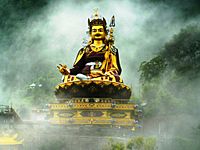Padmasambhāva facts for kids
Quick facts for kids
Padmasambhava, Pema Jugne
|
|||
|---|---|---|---|

Colossus of Padmasambhava, 123 ft. (37.5 m) high in mist overlooking Rewalsar Lake, Himachal Pradesh, India.
|
|||
|
Padmasambhava (which means "Born from a Lotus" in Sanskrit) is a very important teacher in Tibetan Buddhism. He is also known as Guru Rinpoche, which means "Precious Teacher." Many people believe he was a special being, just as Buddha Shakyamuni had predicted.
Padmasambhava is seen as the Second Buddha by the Nyingma school. This is the oldest type of Buddhism in Tibet. Around the year 767, he traveled to Tibet. There, he helped build Samye Monastery, which was the very first Buddhist monastery in Tibet. He also introduced a special kind of Buddhist teaching called Vajrayana to Tibet.
Contents
Who Was Padmasambhava?
Padmasambhava is a central figure in Tibetan Buddhism. He is especially important to the Nyingma school. Many Buddhists in Tibet, Nepal, Bhutan, and parts of India look up to him. They see him as a second Buddha.
Buddha Shakyamuni, the original Buddha, is said to have predicted Padmasambhava's arrival. He mentioned that Padmasambhava would be a special form of other important Buddhist figures. Some stories even say Padmasambhava was a direct rebirth of Buddha Shakyamuni himself.
How Padmasambhava Was Born
There are many interesting stories about how Padmasambhava was born. Some accounts say he appeared instantly on a mountain. Others suggest he was born from a mother.
However, most stories describe a miraculous birth. They say he appeared suddenly from the center of a lotus flower. These different stories are not seen as a problem. Highly enlightened beings can appear in any way they choose.
Padmasambhava's Teachings
Buddha Shakyamuni mainly taught two types of Buddhism: Hinayana and Sutra Mahayana. He taught the Vajrayana teachings to only a few students in private.
As a special rebirth, Padmasambhava is believed to have fully shared the Vajrayana teachings. Vajrayana is also known as Tantra. It builds upon the Mahayana teachings.
Special Buddhist Lineages
In Tibetan Buddhism, the Vajrayana teachings brought by Padmasambhava have two main ways they are passed down:
- The Kama lineage is an oral tradition. This means it is passed down directly from teacher to student through spoken words.
- The Terma lineage is a hidden treasure tradition. Padmasambhava and his student Yeshe Tsogyal started this. These "treasures" are hidden teachings. They are discovered by special people called Tertöns when the time is right.
Padmasambhava is also connected to the Dzogchen lineage. This is a very high level of teaching in the Nyingma school. It is believed to have been passed directly to Padmasambhava.
Padmasambhava's Influence
Padmasambhava is often seen by Tertöns in visions. His image is also used in a special meditation practice called guru yoga. This is very common in the Nyingma school.
The Nyingma school considers Padmasambhava to be one of its founders. He helped establish Vajrayana Buddhism in Tibet. He also brought the highest forms of Dzogchen teachings there. He truly changed the entire nation of Tibet.
Images for kids
-
Colossus of Padmasambhava, 123 ft. (37.5 m) high in mist overlooking Rewalsar Lake, Himachal Pradesh, India.
-
A piece of the Testament of Ba at the British Library. It shows six lines of Tibetan writing.
-
The entrance to Dawa Puk, Guru Rinpoche's cave, in Yerpa, 1993.
-
A statue of Padmasambhava in Hemis Monastery, Ladakh, India.
See also
 In Spanish: Padmasambhava para niños
In Spanish: Padmasambhava para niños
 | William Lucy |
 | Charles Hayes |
 | Cleveland Robinson |






















